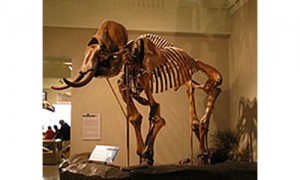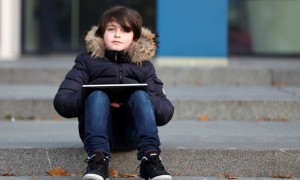韩国家长希望破灭 现在只希望收尸
Twenty parents of missing high school students gathered behind a television truck Sunday afternoon and talked about a subject that, for days, they hadn’t been willing to broach.
“Realistically,” one parent told the group, “we need to acknowledge that we have no hope of finding our children alive.”
Nobody disagreed.
Instead, they discussed the logistics of recovery, of finding a way to pull their teenage children from the water as quickly as possible. That, they agreed, should be the new focus of a government search unfolding about 10 miles off the coast.
The parents took turns talking. There were bags under their eyes. Their voices never rose. A few puffed cigarettes. They’d been asked by the South Korean coast guard to offer opinions about the next stage of the search, and here they discussed in detail ways to lift the submerged ferry out of the Yellow Sea, if only as a way to end an impossibly bleak wait.
“People have lost hope very quickly,” Yoo Kyeong-geun, the father of an 11th-grader on the ferry, said after the meeting. “Until yesterday, nobody could even talk about dragging the ship out of the water” — a jarring step that would endanger any survivors—“but now a lot of people say it. It’s just so we can see our kids’ faces one last time before their bodies become more damaged underwater.”
After the ferry with 476 people aboard capsized Wednesday, relatives who rushed to this rural port town — a staging area for the recovery effort — were frantic, so furious about the pace of the rescue operation that they doused the prime minister with water. By Sunday, those relatives had grown hushed, and at Jindo’s port, bodies were brought to shore in twos and threes.
The Sewol had been sailing from Incheon to Jeju when it tilted and sank off the southwestern coast of the Korean Peninsula. So far, 174 passengers have been rescued — all in the first few hours of the disaster. South Korean officials on Sunday released an extended transcript of communication between the stricken vessel and maritime operators, shedding light on some of the confusion aboard before the ship lost contact.
Within 19 minutes of placing a distress call, a Sewol crew member said three times, when asked about passengers aboard, that it was difficult to move around the dramatically tilted vessel.
“The ship is tipped over too much,” the crew member said at one point. “It’s impossible to evacuate.”
Some survivors say an evacuation order was never given, and those who heeded crew advice to stay in place were most likely trapped aboard after the ferry overturned.
The relatives of those who didn’t make it out are now waiting. Some loved ones of the 244 still missing are camped out at a gymnasium 30 minutes away. But many spend their days at the port, where a tent city with volunteers, free food and cots has sprouted. The tents span a quarter-mile — the Red Cross here, mobile food trucks there. Another tent has only a whiteboard, labeled at the top “List of Names.” Dozens of people at a time stand around the list of victims, photographing it, staring at it, sometimes sniffling.
When bodies are found offshore by divers, an official walks over to the list with a pen. On Sunday, the list began with 36 names. By sunset, there were 58. Some had been identified by their height and appearance, others not at all. No. 48 was Guk Seung-hyeon, one of the 325 high school students heading on a four-day trip. No. 49 was a man, 5-foot-7, wearing blue jeans and a sweatshirt.
In the first four days of the search, bodies were found slowly, only when currents washed them out of the ferry and into the Yellow Sea. But late Saturday, divers had punctured a hole in the vessel, opening up the first passageway to some of the chambers. After that, police vessels began pulling up to Jindo’s port every hour or two with bodies.
No. 50 arrived at 2:10 p.m., along with Nos. 51 and 52, sending many of the relatives in the tent city scrambling to the docks. Dozens of police officers stood at attention in rows, and six officers carried each of the covered bodies toward yet another tent, marked “Identification.” An official gathered relatives of the missing and described some of the identifying characteristics of the latest three found dead. New Balance sneakers. Track pants. Most heard the description and walked away.
Several hours later, Yoo and the other parents were discussing ways to speed up the search. They talked about stationing a barge in the area that divers could use to rest and to put on equipment. They also talked about hoisting the ship from the sea floor—a process that will require several massive marine cranes and a floating dock.
“Do you even know how long it takes to pull a ship out of the water?” one father said. “I’ve heard 20 days.”
Yoo said that depending strictly on divers seemed to him a method “30 or 40 years old.”
Yoo’s daughter, Yoo Ye-eun, attended Danwon High School in Ansan, a city just south of Seoul.
“I’ll stay here until it’s all over,” Yoo said. “Until I leave here with my daughter.”
4月20日下午,二十位韩国失踪高中生的家长聚集在一起,一位家长告诉其他家长说,“事实上,我们得承认我们的孩子活着回来是没有希望了。”
没有人对此提出异议。
相反,他们讨论搜寻尸体和尽快从海里捞出孩子的工作。他们认为这些才应该是政府在离岸十英里范围内开展的搜救工作的新焦点。
家长轮番讲话。明显的眼袋和低沉的说话声透漏出失望的心境。有些人苦闷地吸着烟。韩国海岸警卫队员请求这些家长对下一步搜救计划提出建议,而现在他们正详细地讨论如何把在黄海淹没的渡船拉出来,如果这一方法真的能结束这毫无希望的等待。
一位在遇难渡船的高中二年级学生父亲刘京根会议后说道,“人们很快就失去了希望。昨天为止,还没有人能够谈论把轮船拖出水的事情——这一举动会危及幸存者——但现在大部分人都同意了。因为人们想在尸体浸泡腐烂之前最后一次见一见孩子。”
4月16日,载有476人的客船倾覆后,急忙赶赴到这个海港小镇——进行搜救工作的集结待命区——亲属们无法镇静,并且对搜救工作的速度和进程感到非常愤怒,最终甚至往总理身上泼水。4月20日,亲属们渐渐镇定下来,同时在珍岛港也可以看见偶尔三两具尸体被拖出海岸。
“岁月”号客船在从仁川开往济州岛的途中倾斜、沉陷于朝鲜半岛的西南海岸处。到目前为止,174名乘客得救——都是在事故发生后的几个小时内得救的。韩国官员在4月20日公布了遇难客船与海上指挥官之间的通信记录,揭露了客船失联前的一些谜团。
在发出求救信号的19分钟内,当岁月号船上工作人员被问及乘客情况时重复三次地说,在如此剧烈倾斜的客船里走动是非常困难的。
该船员说道:“船只倾斜得很厉害,疏散工作根本无法进行。”
一些幸存者说他们没有听到任何疏散撤离的指令,并且那些听从船员原地不动命令的人很可能在翻船后困在里面了。
没逃出沉船的乘客家属现在还在等待中。244名遗失者的亲人驻扎在离事发点30分钟车程外的体育馆内。但许多人会在港口昼夜等待,那里已经形成了小型帐篷区,给亲人家属提供志愿者服务、免费食物和床位。
当潜水者把尸体拖到岸边时,一名官员会拿着笔和名单走过去。4月20日,名单里只有36个名字。到日落时,就达到了58个。有些人凭身高和长相就被认出了身份,但其他人根本无法认出来。48号是郭圣贤,是前往四日游旅行的325名高中生之一。49号是一名男性,一米七左右,穿着蓝色牛仔裤和运动衫。
搜救前四天内,找到尸体的速度很慢,只有强劲的海流把尸体冲出船只,漂到黄海时才能找到。但上周六晚些时候,潜水者们在船体上戳出了一个洞,打开了首个通往一些房间的过道。之后,警船开始每一到两个小时内往珍岛港拖运出尸体。
50号尸体是在下午2:10抵达岸边的,同时还有51号和52号。这使许多在帐篷区的亲人们慌乱冲向码头。十多名警官站成一排,保持秩序,而六名警官各自搬出一具被白布盖住的尸体,前往另一个标有“指认”的帐篷。一名官员聚集了遗失乘客的家属,并描述最新三具尸体的一些身份特征。新百伦运动鞋。长运动裤。大部分人听完描述后纷纷离开。
几个小时后,刘京根和其他家长正讨论加快搜救工作的方法。他们谈到要在搜救区域放入一艘驳船,以便潜水者休息和存放随身设备。他们还谈到要把船吊出海平面,而这一方法需要投入好几架大型海上起重机和一个浮动船坞。
一位父亲说道,“你知道把一艘船拖出水要花多长时间吗?我听说要20年。”
刘京根说完全依靠潜水者来进行搜救工作对他而言像是“30或40年前的方法”。
刘京根的女儿刘艺恩就读于安山的檀园高中,位于首尔市南部。
刘京根说:“我要呆在这里,直到这一切都结束为止,直到我带着我女儿离开。”







